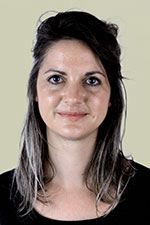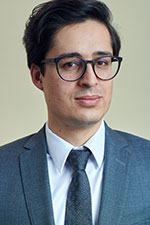Navigation auf uzh.ch
Navigation auf uzh.ch
Tomorrow’s innovative research starts with today’s talented junior researchers. Every year, the University of Zurich Graduate Campus and the Mercator Foundation Switzerland give the Mercator Award in recognition of outstanding academic achievements from junior UZH researchers.
Improved hydrological forecasting
This year’s Mercator Award for Medicine and Sciences is shared equally by Simon Etter and Barbara Strobl, two doctoral candidates at the UZH Department of Geography, in recognition of their PhD theses on the CrowdWater project. One of the first citizen science initiatives at UZH, CrowdWater uses an app for gathering hydrological data that enables citizens to work with researchers all over the world to collect information on water levels in rivers and streams, ground humidity, and plastic waste pollution, and feed it into a central database.
The ultimate goal of the project is to improve water management and hydrological forecasting. “With the help of a large number of volunteers we haven’t just been able to find out more about hydrological processes. It’s also helped create flood forecasting models in regions where there would otherwise be a lack of relevant data,” explains Strobl. “We’re also hoping for novel methods of gathering hydrological data based on citizen science that ultimately benefit everyone,” adds Etter.

What helps people with disabilities
Since the launch of the UN Convention on the Rights of Persons with Disabilities in 2008, there has been a major change in the way people with disabilities are treated in humanitarian contexts, from a medical and charitable to a human-rights-based approach. While the former emphasizes direct rehabilitative or material aid, the latter focuses on enabling people to be independent by means of consciousness-raising and training. In her ethnographic PhD project, Maria-Theres Schuler investigated what this paradigm shift means for the situation of people with physical disabilities in a Ugandan refugee settlement.
Schuler spent a year living and working with people with disabilities and a number of aid organizations. She looked at what types of aid affected these people’s social relationships. “What I found was that direct material or financial assistance was more likely to help people with disabilities lead a more self-determined life,” explains the junior researcher.
For this reason she advocates an alternative approach when it comes to distributing aid, one that takes account of the different forms of dependency. Schuler’s critical engagement with humanitarian aid has earned her the Mercator Award in the Arts and Social Sciences.

Legal relevance of social norms
The Mercator Award for Law and Economics goes to the lawyer Oliver William. In his research project, he looks into trade practices and commercial practice – in other words practices and customs in trade that have become firmly established as rules of conduct that market participants expect to be complied with. Even though rules of conduct based on custom are not legally binding, they do influence contractual rights and obligations.
In his research project William examines the status the law accords to these social norms. With the help of insights from sociology he has been able to classify the legal relevance of social norms in different legal systems. Because social norms only ever apply to a specific peer group, William is devising a model to demarcate such peer groups. “My study has showed, for example, that the reinsurance industry relies heavily on conventions and customs,” he explains. He has also been able to show how social norms affect the interpretation and amendment of contracts, and the identification of secondary contractual obligations.